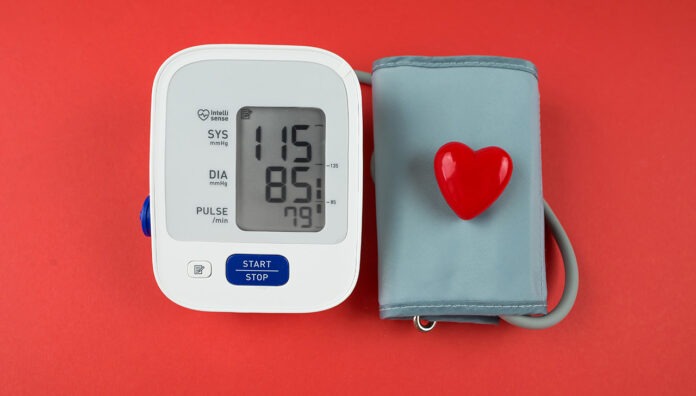A study led by Flinders University and the Southern Adelaide Local Health Network shows that the anti-rheumatic medicine methotrexate significantly reduces blood pressure in some patients compared with sulfasalazine – the first clear evidence of this effect in patients newly diagnosed with rheumatoid arthritis (RA).
The common autoimmune disease occurs in around one in 100 people, leading to inflammation and pain in the connective tissue of the joints.
The inflammation caused by RA contributes to high blood pressure by damaging blood vessels, prompting rheumatologists to realise that people with RA don’t typically die because of their condition, said lead researcher Professor Arduino Mangoni, Head of Pharmacology at Flinders University College of Medicine and Public Health.

‘The main reason people with RA die is because they have a cardiovascular event, such as a myocardial infarction or stroke,’ he said. ‘And this is often because of an excess prevalence of hypertension in these individuals.’
High blood pressure can significantly shorten the life expectancy of people with RA.
‘An epidemiological study quantifying the burden of cardiovascular disease in people with RA concluded that the increased risk imparted by rheumatoid arthritis was similar to diabetes,’ Prof Mangoni added.
What impact did methotrexate have on blood pressure?
Methotrexate is not the only anti-rheumatic medicine that can reduce hypertension, with hydroxychloroquine also being shown to be potentially protective against atherosclerosis, Prof Mangoni said.
‘So we wanted to use the comparator, sulfasalazine, that was still an anti-inflammatory drug [to test in] people with RA, but with very neutral effects on blood pressure,’ he said.
Among patients with RA, the blood pressure of those taking methotrexate differed by an average of 7.4 mmHg compared with people taking sulfasalazine.
‘Most tablets for blood pressure, when given at a moderate to high dose, will have an effect on blood pressure of between 5–10 mmHg – which is normally, at the population level, associated with the reduction in cardiovascular risk of around 10–15%,’ Prof Mangoni said. ‘So by extrapolation, methotrexate compares very well to a traditional antihypertensive medication.’
In patients with RA who don’t have hypertension, methotrexate could also have a preventative effect.
‘That was very well shown in our study, with only a proportion of [participants] having hypertension,’ Prof Mangoni said.
The medicine can also be assumed to lower cardiovascular risk.
‘If there is a positive effect on blood pressure, consequently, you should have a reduced risk of myocardial infarction and stroke, as well as potentially heart failure,’ he said.
Although the impacts of methotrexate on these indications were not specifically tested in the research, the observational results are promising.
‘They are in line with increasing clinical evidence from epidemiological studies that the use of methotrexate is associated with a reduced risk of heart failure, heart attacks and strokes in people with RA,’ Prof Mangoni said.
Is there potential for a new indication?
In people who have both hypertension and RA, there’s a possibility that medicine regimens could change, Prof Mangoni said.
‘The future should address whether the use of methotrexate in this population can allow modification of antihypertensive medications to have a different treatment regimen,’ he said.
‘Methotrexate could also be an adjuvant, but this can only be tested in adequately designed prospective studies.’
Beyond patients with RA, it’s possible that methotrexate might also be indicated for patients with hypertension in the not-too-distant future. But Prof Mangoni concedes this is an ‘increasingly debated topic’.
‘There has only been one study, published 5 years ago, that looks at the effects of low-dose methotrexate on cardiovascular risk in people without RA,’ he said.
‘The idea was that by giving methotrexate to this population that already has a high pro-inflammatory burden, you would actually reduce the risk of atherosclerosis.’
While this study didn’t yield positive results, there are a few reasons behind this that warrant further exploration. The participants in both the intervention and placebo groups did not have particularly high inflammatory markers, and both groups also received folic acid.
‘Folic acid is given together with methotrexate because it has been shown to reduce the toxicity of [the medicine],’ Prof Mangoni said. ‘However, folic acid can also be protective against atherosclerosis. So the fact that it was also given to the placebo arm might have somewhat diluted the protective effects of methotrexate in this trial.’
To best assess the effects in future research, he suggests a trial design comprising three arms: methotrexate plus folic acid, folic acid alone and the placebo group.
‘I suspect that in the future, methotrexate might have value in people without autoimmune diseases, but with a high inflammatory burden,’ he said.
What role does genetics play in the success of therapy?
Another key finding from the research is that methotrexate may not be the right fit for everyone. The medicine has a complex pharmacology, with several mechanisms facilitating its uptake and storage in cells, Prof Mangoni said.
‘Sometimes it is excreted by the cell, so it [reaches] different targets, with each of these targets potentially having genetic variations,’ he said.
Research has shown that there are several genetic polymorphisms that render people more or less responsive to methotrexate in terms of blood pressure reduction.
‘Interestingly, the polymorphisms that we observed [in our research] are different from the polymorphisms that have been previously described,’ Prof Mangoni said.
‘So future research should look for personalised treatment strategies to identify whether these polymorphisms are similar or different to other polymorphisms responsible for blood pressure reduction – and potentially the reduced risk of atherosclerosis.’
In further research, Prof Mangoni is keen to confirm the role of polymorphisms in lowering blood pressure after treatment with methotrexate, with pharmacogenomics determining who is a suitable candidate for the medicine.
‘The idea is to have a comprehensive genetic panel in people who are considered for treatment for methotrexate to determine from the very beginning who is more or less likely to respond,’ he said.
‘The next step is determining whether these polymorphisms could be translated into a non-RA population to see whether this can be tailored to the treatment of methotrexate in these [people].’



 Rebecca Davies[/caption]
Rebecca Davies[/caption]

 Professor Clare Collins[/caption]
Professor Clare Collins[/caption]
 Associate Professor Trevor Steward[/caption]
Associate Professor Trevor Steward[/caption]



 Amy Gibson MPS[/caption]
Amy Gibson MPS[/caption]






